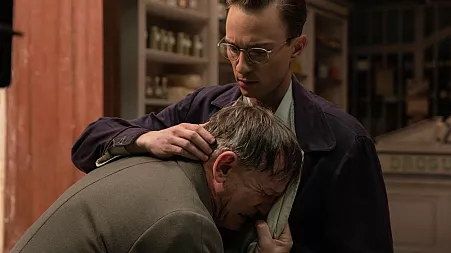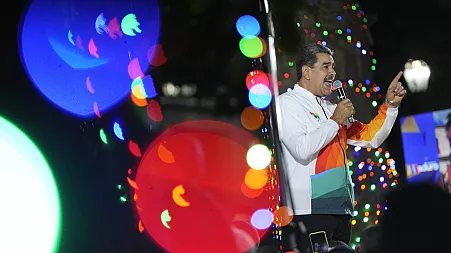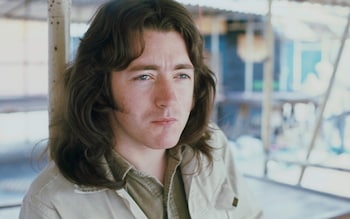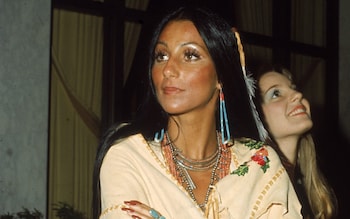"I'm not afraid of robust language. I'm not afraid of theatricality on camera. I love a big, bold, truthful performance."
Carrie Coon is having a moment, even though you may not recognize her. "It may be the age I am, but it's also I don't present in the world like any kind of film star." The Emmy-nominated star of The Gilded Age will next be seen in Netflix's His Three Daughters (September 20). "The relationships feel real, the dynamics feel believable and yet it's still an Azazel Jacobs movie." While Coon was taken by the story of three daughters caring for their ill father, it was working alongside Natasha Lyonne and Elizabeth Olsen that sealed the deal. "I immediately signed on when I heard their names." While her family thinks of her as "lighthearted," she often plays, "high-strung, anxious people." "I'm not afraid of theatricality on camera. I love a big, bold, truthful performance. I don't feel like you always have to be small for camera. And sometimes, frankly, I think it's really boring." While she's "grateful no one ever recognizes me," that could change soon with the third season of The White Lotus. For now, Coon says things are as they should be. "I wouldn't have it any other way."
SUBSCRIBE TO THE PARTING SHOT WITH H. ALAN SCOTT
ON APPLE PODCASTS OR SPOTIFY
Editor's Note: This conversation has been edited and condensed for publication.
First things first, congrats on your Emmy nomination for The Gilded Age. You must be so excited!
I am, mostly because it wasn't looking good for a third season. We didn't think we were going to get one, especially with everything happening with the strike. The viewers, the numbers were just so high, and it started to catch on just in time. And so we just went back into production a couple of weeks ago. The fact that we get to open our third season with this recognition for everybody's hard work, because period pieces are hard, the hours are so long, and everyone's worked so hard. And to finally have our costume department get recognized, and our hair department, and certainly production design, again, that's the only other Emmy we have. And Christine [Baranski], of course. It just gives us a real shot of energy. Our first two days were both 16-hour days, so we're back pretty hard. Even though we have been dark for 18 months, the whole crew came back, and it's like a family. It's great.
Watching His Three Daughters was so real. I went in for you and your co-stars, and then I found myself forgetting it was the three of you. What interested you about doing it?
Well, I believe it's just as you describe. The reason I think you went through all that when you watched it is because it feels like real life in the best way. The relationships feel real, the dynamics feel believable, and yet it's still an Azazel Jacobs movie. So, it's not entirely realistic, as you know, and also the form follows the function. So one of the things that's happening in the film is that [when] it starts off, the sisters are all in their own individual shots, and you experience them as the stereotype of what they are. And as the sisters' points of view get complicated about each other, the audience's point of view also gets complicated. So I think the movie unfolds for the sisters the same way it's unfolding for the audience, and it's just so specifically wrought in that way. And having worked in TV for so long now, a lot of TV feels very arbitrary. So when you get to work with a filmmaker who's that specific and has a very clear vision for what they want, it's just very gratifying. And then to have him say, by the way, Natasha Lyonne and Elizabeth Olsen are going to do it too, and I've written it for the three of you, and just to have everybody sign on in that spirit, was just, I mean, how often does that happen?
How did you respond to your character?
Well, I often play harried moms. I often play high-strung, anxious people. My family finds that all very mystifying, by the way, because I can be controlling, but I'm pretty relaxed, actually. So it is interesting that that's the kind of character that I play. I think I'm known as pretty hyperverbal, so I think those two things often go together, right? Women who are strong [and] verbal acuity. And in that first opening speech, I think there's not even a period for the first six lines or something in that speech. So it's rhythmically very specific. But I wasn't surprised Azazel saw me like that. In my family, I operate as an oldest child, even though I'm the middle of five, so I have a certain level of responsibility, and I'm comfortable with that. And I like playing people that are unlikable. When people have seen this movie, they say, "Oh, I think I'm a little bit Katie." They see themselves in it. Because the other thing about the realism is that she's also emotionally immature, which is why she can't see the person who's right in front of her, and so even when she apologizes, it's inadequate and unsatisfying. But I think her sisters and the audience recognize, well, that person is doing the best with what they've been given, and that feels really real. And that kind of grace extended to someone feels very realistic to me.
I love a complicated character, and your character definitely is complicated. It's difficult to like her, but ultimately you do.
Yeah, she feels like a person. I feel like Azazel wrote people, and I think that's hard to find. So often you can always anticipate what's going to happen in traditional narrative because of all these stereotypes, because of narrative structure that we're accustomed to. And I feel like the thing I love about Azazel's filmmaking is his willingness to break some of those expectations and play around with those tropes, even as he's trafficking in them. And who doesn't want a more complicated character?
That must be fun to play.
Similar to Bertha Russell on Gilded Age, there's a kind of energy about that. There's a drive about it that makes finding action easier in a way, right? Because you're driving the story, pushing the pace, or pushing the scene, or pushing on a person, and that's very active. So as an actor, you want something active to do.
What was it like working with Natasha Lyonne and Elizabeth Olsen, and what did you learn from them through the process?
Of course, I immediately signed on when I heard their names and when I read the script. This is such an interesting time to work with Natasha, because she really is at the apex of her career. She's producing, directing, she's acting, she's winning awards. She has a new lease on life, quite literally survived her addiction. She has a sort of radical pursuit of the truth in every moment, and she's fiercely intellectual. I mean, she's a very smart woman, and it's so interesting she plays these stoners. She speaks very eloquently about why she decided to take on this particular stereotype, and I will certainly let her speak for herself, but it's an extraordinary time to be with her in her life. And similarly, Lizzie, she arguably has the most complicated role. I think that sister has the weirdest amalgamation of characteristics, and I wouldn't have had access to that. I couldn't have played that part, and to watch her just sit down and take on that first speech, the sort of floaty, dreamy person. She makes light. She spins. She's just lit from within that one. Working with Lizzie right now, I feel like she's not even been given her best opportunities yet. So working with her is delightful. I just can't wait to see what's down the road. And because she's younger than me, in 10 years, what's Lizzie Olsen going to be doing? I mean, I get chills thinking about it.
Watching the three of you right now, it's just so exciting, and it sadly feels rare. I'm thinking in the '80s we had Jessica Lange, Sissy Spacek, Diane Keaton, all acting in projects together, doing great work. I feel like the three of you are the modern-day equivalent of that.
Often in film, there's only room for one of us, and so we rarely get to work with each other. I feel like it's changing a little bit, but it's changing in TV faster than it's changing in film. And you're right, it was done before, and we lost touch with it. So I'm so thrilled just to have a film where I get to work with other women that are sort of my age at the apex of their careers. There's sort of nothing more exciting than that for me as an artist, and so rare. It's just so rarely done.
In watching the film and your work in general, I'm often left wondering, does she ever want to do comedy? Your characters are often so serious.
My grandma, who's passed, she used to say, "Why don't they let you do Born Yesterday?" Because my family thinks of me as quite lighthearted, quite funny. But the industry, just the way I've been pigeonholed, I do a lot of drama, and thankfully I've done it well enough to continue to do it. But White Lotus tiptoes into a little of that [comedy]. Ghostbusters I didn't really have much of an opportunity, but at least it was in that world. And so, I'm hopeful that I get to tiptoe a little more in that direction, because I think that also feels more real. My husband's really funny. Even his most dramatic plays are filled with laugh-out-loud humor, because if people are laughing, then they're listening. And I don't like work that's purely one thing, because it doesn't feel like it mirrors the human experience very effectively.
The Gilded Age really has become part of the social conversation in a way I did not see coming but am so excited it has. Like it really took social media by storm. How does it feel to have fans respond to the show like they have?
The show was entirely saved by gay people on Twitter. I feel like the show is entirely saved by the gay community. There's no gay person in my life who's not watching it. Those are the people who fangirl out on the street. I really believe that, because I don't know how else it would have become part of the zeitgeist without the gay community. Because of the theater connection, the Broadway connection, was already just fodder for all of the theater nerds out there, and I think they single-handedly saved it, frankly. I told everyone we were canceled. Our options lapsed. I mean, we were effectively canceled. We were not under contract anymore. We were all considering other work. The strike was on. We were able to kind of reassemble the cast for season three, but it really was like a snowball. But it feels great. We just feel really like this little show that could, even though it's massive, our budget cuts were all over, we've been joking how we're using the bargain box at Mood Fabrics to make our costumes. And all the scenes are going to take place in one room. I've been doing scenes in my bedroom in pajamas because we don't pump the budget for dresses. And so hope that the energy continues, and that we can continue to make a season four.
There is a rhythm to the language that does seem to suit you on The Gilded Age. Is that something that you notice?
I think it's a chicken-or-egg sort of thing. I come from the theater, I did exclusively theater for many years before I had the chance to do TV and film, and so it's hard to know if it's that those projects attract actors who have facility with language, or that actors with language facility are attracted to those projects. [The Gilded Age] casting a bunch of theater actors in Gilded Age for a reason, because the language is heightened. It's not entirely naturalistic, and you are working in a period dialect that doesn't really exist. You're sort of making it up because there are no recordings of it. It really feels theatrical when you're doing it for camera. It can be quite campy, it is sometimes high camp in a way that you have to just sort of embrace it. But I do love it. I'm not afraid of robust language. I'm not afraid of theatricality on camera. I love a big, bold, truthful performance. So I don't feel like you always have to be small for camera. And sometimes, frankly, I think it's really boring. I feel like oftentimes those film performances aren't very embodied. You feel like people are just acting with their faces and what their faces look like. And it's not in the body at all. It's not rooted in the body. And when you're doing these period dramas and you're carrying those costumes around in those big spaces, you have to fill that space even though it's for camera, and so you can't be afraid of it. Some days are more successful than others, like any job. But it's TV, it moves quickly, and the rhythm of our show is so fast. And I think Julian [Fellowes, creator and writer] and Sonja Warfield, our other writer, who's great and really has done a beautiful job, especially complicating that African American diaspora, which I get thrilled every time we go further and deeper into that community, because you haven't really seen it depicted in this time period. I love it. I find it just really sexy and fun and attractive. And [I] just love seeing Audra [McDonald] in those costumes, and Denée [Benton] and every time we bring more people into the fold and that story, I just get really, really thrilled by it. I think Julian and Sonja really embraced the pace of the storytelling, which Julian knew from Downton Abbey. It's not like that was a revelation for him. Downton moved pretty quickly, it just had a more English sensibility, which was just naturally a little slower rhythmically. It's a great escape.
Now I know you can't say much, but the fact that you're in the third season of The White Lotus is so cool. How exciting is that?
It hasn't really hit home, because the unfolding of the show happens on the internet when the show comes out. When you're making the show, it's just your life. You don't have any sense of the way it's going to land in the world. When you're making it, you're just living your life every day. You just happen to be living it in Thailand from February to now. The process was really intense because of the extreme conditions in Thailand. And the cast this year is so big and so international and just really dynamically, very different, very varied acting styles. But it's what Mike [White, creator] does best. He brings these groups together. And you think, "Is this gonna work?" And then somehow he and his editor managed to pull these pieces out and make this really compelling show. While you're making it, it's really hard to tell what you've got. And as far as being part of both of those shows, I mean, nobody's working right now. We have not recovered from the strike. Not only are we not working, but wages are down. We're not seeing series regular contracts. We're seeing guest star contracts. And so it feels like a really punishing environment in some ways, when you are negotiating and most of us are out of work. So the fact that I am headlining the Gilded Age and then bringing up part of this ensemble on The White Lotus feels like most people should probably hate my guts, frankly. I hope I can do it so people aren't just sitting around going, "Well, I could have done that better." It's not lost on me how fortunate I am. I'm incredibly grateful. I also recognize that 10 years from now, it'll be somebody else. Who knows how many more years I have left. I got two kids, I don't know how long I can keep balancing motherhood and work, so I'm just going to enjoy it and appreciate it while I have it, and recognize just how fortunate I am in this moment. I'm working, my husband's working. And we're feeling for our friends who have struggled these last couple of years, and our friends who are just trying to survive until 2025 when we hope to see a little more recovery in the industry.
One of the first things I saw you in was Gone Girl. Do you ever get recognized for that anymore?
I never get recognized for Gone Girl. I rarely am recognized. Period. It may be the age I am, partly, but it's also I don't present in the world like any kind of film star, that's for sure. But I think the only people who recognize me are Leftovers fans. Because there's nothing trite about people's experience with grief, and oftentimes, people who had the most resonant experience with that show were dealing with something very extreme or tragic in their own lives. And so, every now and then, somebody will mostly hear my voice and say, is that Nora Durst? But honestly, I never get recognized anywhere. People are more likely to say, did you go to high school at this such and such place in Minnesota? And I'm like, "No." I love it. I wouldn't have it any other way. I feel blissfully unblessed. In fact, I was at a cast party for the Gilded Age with my blonde hair. People were like, "You weren't there." I was there. Our crew members have only seen, because of COVID, they would only see us all finished, so they've never seen me without my wig and my costume on. And so I talked to somebody who was on the ad team, they didn't know who they were talking to. I'm very grateful no one ever recognizes me.
Request Reprint & Licensing Submit Correction View Editorial GuidelinesAbout the writer
H. Alan ScottShare on Twitter
A writer/comedian based in Los Angeles. Host of the weekly podcast Parting Shot with H. Alan Scott, every week H. Alan is joined by a different celebrity. Past guests include Tom Hanks, Keke Palmer, Melissa McCarthy, Michelle Yeoh, Jeff Probst, Tiffany Haddish, Jamie Lee Curtis, Idris Elba, Bette Midler, and many more. He also writes the Parting Shot portion of the magazine, the iconic last page of every issue. Subscribe to H. Alan's For the Culture newsletter, everything you need to know in pop culture delivered to your inbox every Tuesday and Thursday. H. Alan has previously appeared on The Jimmy Kimmel Show, Ellen, CNN, MTV, and has published work in Esquire, OUT Magazine and VICE. Follow him @HAlanScott.
A writer/comedian based in Los Angeles. Host of the weekly podcast Parting Shot with H. Alan Scott, ... Read more
Disclaimer: The copyright of this article belongs to the original author. Reposting this article is solely for the purpose of information dissemination and does not constitute any investment advice. If there is any infringement, please contact us immediately. We will make corrections or deletions as necessary. Thank you.




